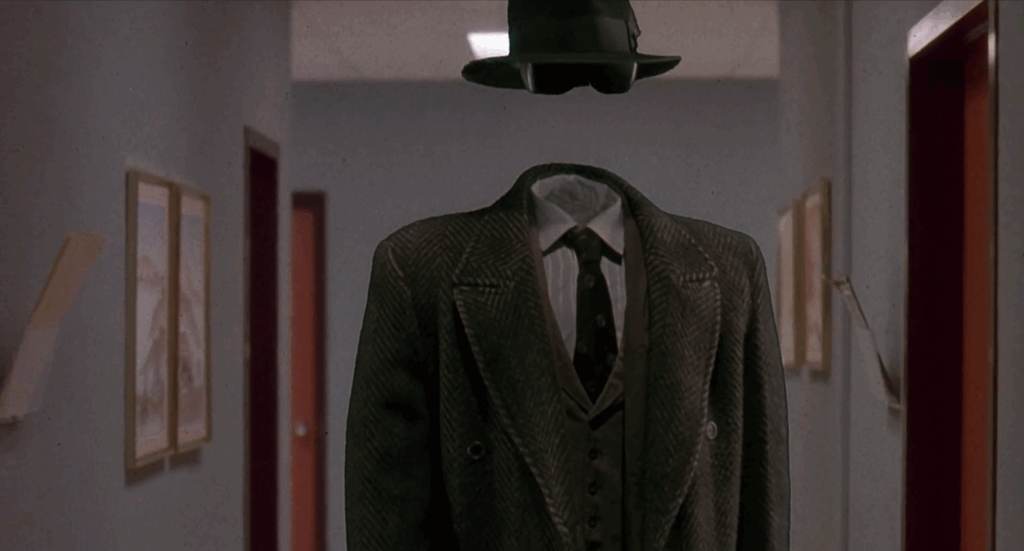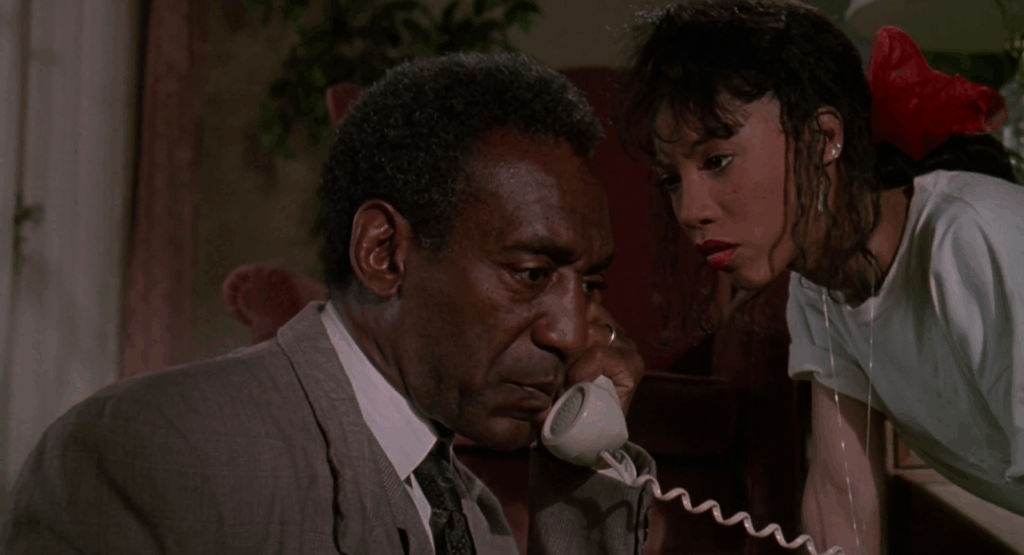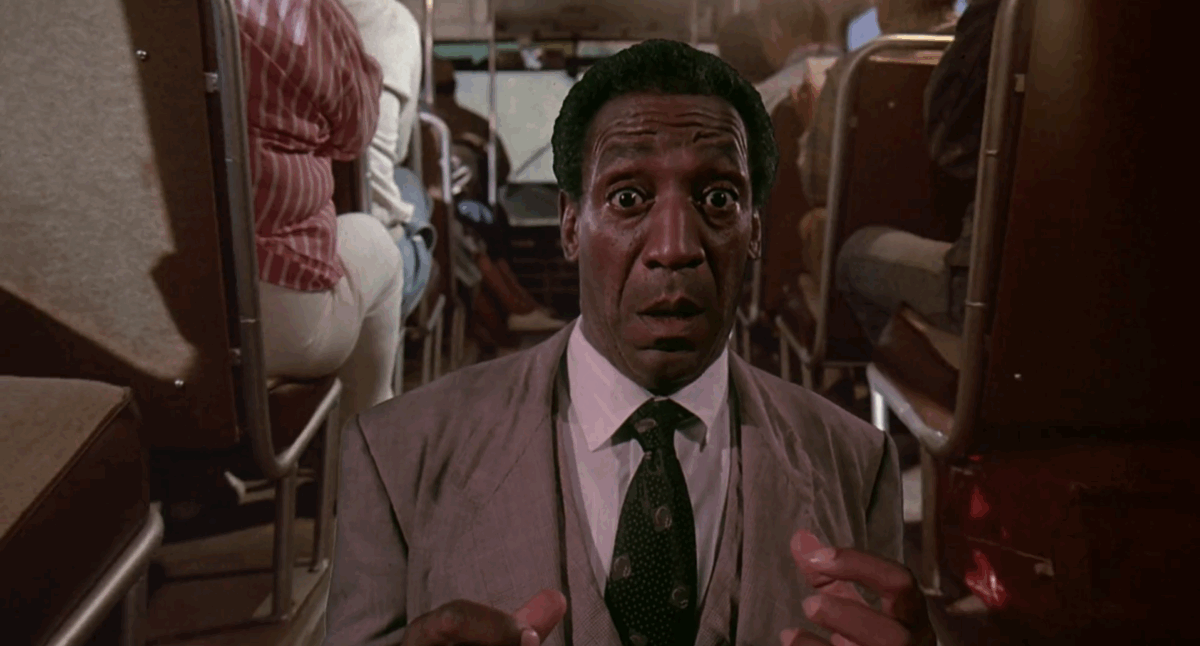Ghost bad
It’s not exactly news that watching a Bill Cosby movie in 2025 is an uneasy proposition. But even if you set aside the baggage of spending an hour and a half hanging out with a serial rapist — which, to be clear, I am not endorsing — Ghost Dad is a pretty miserable watch. It fails in ways that transcend Cosby’s wrecked reputation, offering an tedious mess of a film.
Released in 1990 when Cosby was one of the most famous people on the planet, Ghost Dad was one of a couple of panned attempts to bottle The Cosby Show magic for the big screen. Hollywood salivated for a crossover hit to make Cosby a movie star on par with Tom Hanks or Eddie Murphy. Instead, they got a pair of massive duds — Leonard Part 6 and Ghost Dad.
The plot is about as high-concept as the title suggests: Cosby plays Elliot Hopper, a widower and workaholic who, after a taxi accident caused by a Satanist cabbie (Raynor Scheine), becomes a ghost stuck on Earth for just a bit more time. Meanwhile, he’s scrambling to close a big work deal, which he decides to keep pursuing even in a state of dubious corporeality in order to get a promotion and set up a better insurance payout. (Or some such.) An English psychic medium connects with Elliot and tells him he will leave the physical plane at a specific deadline — Thursday, close of business. (Because even the afterlife respects corporate deliverables and business hours, apparently.) Hijinks, such as they are, ensue.

The real star of Ghost Dad is the baffling and extensive list of rules for ghosts operating in our earthly plane. Let’s run down the basics: (1) Elliot can walk through walls, and sometimes fall through floors, but also can hold physical objects. (2) He can’t be seen in light, so he always needs to hide behind shades and in shadows if he wants to be seen. (Invisible Dad would honestly have been just as accurate a title. Also, the rules about disappearing are inconsistent about whether his clothes disappear with him.) (3) Elliot can transport himself through the telephone to give his daughter’s obnoxious boyfriend a whack. (4) He can’t talk, but he can project his voice into people’s brains so they think he can talk. He learns this trick almost immediately and it’s never brought up again, meaning this “rule” is only relevant for about one third of one scene. (5) If he starts flickering, it means he might be on the verge of leaving Earth and entering the afterlife (why this happens sporadically, even though we’ve already established a concrete time for earthly departure, is left unexplained). (6) If he finds his physical body (i.e. corpse), and it still has some life in it, he can actually actually re-enter it and resuscitate it like Meg at the end of Hercules. This last rule is especially head-scratching because it calls into question whether Elliot is even a “ghost.”
Even setting aside the post-1990 revelations, Cosby’s Elliot is not exactly endearing as a dad. He’s impatient, snappish, and lacking empathy with his kids. Meanwhile, the script — which should have been breezy, given its elevator pitch — gets mired in dodgy side quests, most of which have very little to do with the ghostly aspects of Elliot. It genuinely feels like the set of writers pulled out their old notebooks to mine ideas they’d deemed not quite funny enough for a network TV sitcom. It’s shockingly messy for something that should have been a softball; I mean, if you can’t come up with ten ideas for situations based simply on the title of “Ghost Dad,” you’re doing something wrong.
Cosby’s acting consists of a nice, putrid blend of mugging, grimacing, and flailing as each situation requires. I’m not exactly expecting a nuanced turn given the film’s tenor, but he’s still an annoying presence. Cosby’s best acting zone, from The Cosby Show that I’ve seen, is exasperation at the idiocy around him. But in Ghost Dad, he’s the idiot in question most of the time, so I didn’t really find much charm in anything he did.

The film’s tone is just cataclysmically miscalibrated. It’s levied with the carefree air of a prime time TV show with a laugh track, even when the kids are reckoning with their father’s death. The script includes a strong dash of sexual innuendos and horniness (one of Elliot’s biggest mishaps is the result of hooking up with his girlfriend, who doesn’t know he died, after she accuses him of having erectile dysfunction). Perhaps if the film had opened with the father already a ghost rather than the dad’s slapstick death in a horrible car crash, it could have clicked. But showing the death of a father without showing grief just feels off. If these kids aren’t sad that their dad died, why should I care even at all?
The film is directed by the great Sidney Poitier, Mr. Tibbs himself. Poitier is an on-screen legend, but never built a strong reputation as a director. By far the most interesting part of Ghost Dad is the undercurrent — and only undercurrent, presented without comment or investigation — of a Black man trying to make it in a fast-paced white person’s world. Poitier faced this kind of challenge in Hollywood in real life and probably has some interesting things to say about it, even in a family comedy. All of Elliot’s colleagues are white, and the extra pressure this puts on Elliot to thrive in corporate America against the odds, making a comfortable life for his family as a single dad, might actually be poignant if the rest of the film wasn’t a steaming turd.
I also confess to feeling just a flicker of affection for Ghost Dad because it is an earnest stab at a dead breed of film I miss dearly: the live action, practical effects, family-oriented comedy. Anything with a similar target audience would be rendered in CGI and released by Illumination or the skeleton of DreamWorks. The 2025 equivalent of Cosby would voice a hippo or something. But some of these effects are cool, or at least charming in a silly way: Cosby floating through ceilings; cars passing through him; the character appearing and reappearing as the lights turn on and off, etc. It’s mostly green screen 101, but professionally and cleanly executed. (The overall cinematography is dull as a rock, though — mostly brownish-grayish medium shots and close-ups.)
Any goodwill earned by a handful of practical gags and suppressed ideas about being a Black family in middle class America evaporates long before the credits roll. And with Cosby at the helm, you won’t be dying to give it the benefit of the doubt, anyway. Even with the lunacy of the increasingly labyrinthine ghost rules, Ghost Dad is mostly bad in a dull way rather than a loopy one. Whether you’re watching it out of morbid curiosity or nostalgia for the early ‘90s, the only sensible course of action is to turn on the lights and hope it disappears.
Is It Good?
Not Good (2/8)
Dan is the founder and head critic of The Goods. Follow Dan on Letterboxd. Join the Discord for updates and discussion.


2 replies on “Ghost Dad (1990)”
Having very little experience of Mr
Cosby’s work to start with (Hence no affection for the man or his work to lose), I can only say that by the sound of things this film would have been MUCH funnier if Mr Poitier had starred (If only by dint of being able to play with the High Contrast between his immense gravitas and the goofy high concept: that Mr Poitier’s screen persona is that of the sort of Hard Charger who absolutely WOULD see mere physical death as no excuse to avoid closing a deal is something of a bonus).
Honestly, this film might have one of those inherently delightful High Concepts (“Death is no excuse for lying down on the job”) that also works as a very flexible metaphor for the challenging choices one faces after a near-death experience (For example, a heart attack brought on by a high-pressure job), especially since the ‘flickering’ mentioned could very easily be interpreted as a token of how fragile the protagonist’s grip on life is (I.E. strongly suggesting that even the Dead can push their luck to it’s very limits).
Hopefully someone will work out a way to hose off the basic idea and put it to better use, hopefully without free from painful past associations.
You make an interesting case that there’s more to this metaphor than my eyes detected. But if so, it’s buried pretty deep here, or would require a reworking of the material. It is an interesting idea!